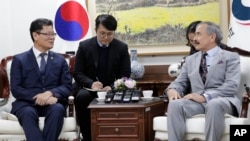Harry Harris, the U.S. ambassador to South Korea, says Washington has softened its demand for how much Seoul should pay for the cost of the U.S. military presence here, but says a gap remains and that “time is of the essence.”
“We have some time left, [but] not a lot of time,” Harris said Thursday, a day after a sixth round of cost-sharing negotiations ended in Washington with no breakthrough.
For the second consecutive year, U.S. and South Korean negotiators were unable to reach an agreement before the cost-sharing deal expired at the end of the year. Both sides hope to eventually reach a deal that would retroactively cover the intervening weeks.
Seoul’s foreign ministry Thursday said both sides expanded their mutual understanding during the latest round of talks, but that there are still differences.
Speaking to foreign correspondents at his residence, Harris said the chief U.S. negotiator has reduced the “top-line number” for how much Seoul should pay for the presence of the 28,500 troops. “He has compromised, so we are now waiting for the Korean side to do the same,” said Harris.
The U.S. had reportedly asked South Korea to increase the amount it pays by five times - a demand rejected by Seoul as unreasonable.
The issue has created an awkward strain in a nearly 70-year-old alliance that both sides tout as “ironclad.” Opinion polls show South Koreans overwhelmingly reject the U.S. demand but still support the alliance and want U.S. troops to stay.
“I pay attention to South Korean public opinion - it’s important,” Harris said. However, he insisted there is no evidence the U.S. financial demands were detrimental to the overall relationship.
“Financial demands only become detrimental if we can’t reach an agreement,” Harris said.
Earlier this week, President Moon Jae-in said South Korea should contribute a “reasonable and fair amount,” noting that any eventual deal will need to be approved by South Korea’s National Assembly, its legislature.
Trump demands
Last year, the U.S. and South Korea were unable to reach an agreement until early February. Seoul eventually agreed to pay $925 million — an 8% increase from the previous year.
The deal only covered a single year rather than five, as in the previous arrangement, meaning the issue continues to be an irritant to bilateral ties.
U.S. President Donald Trump has frequently blasted South Korea for paying what he considers an inadequate amount for U.S. protection. In Seoul, most public anger has been directed at Harris.
In October, a group of anti-U.S. protesters broke into Harris’ residential compound, carrying signs complaining about the cost-sharing talks.
Small groups of fringe protesters have also gathered outside the U.S. Embassy. During at least one of those protests, demonstrators plucked the mustache hairs out of a sign depicting Harris' face.
Harris defends mustache
Harris’ facial hair created international headlines last month, when a South Korean reporter asked the ambassador if he would shave his mustache in order to improve relations with South Koreans. The Korea Times reporter said some South Koreans associate mustaches with South Korea’s former Japanese colonial rulers, many of whom had facial hair.
Harris rejected that notion on Thursday, pointing out that many historical South Korean independence leaders also wore mustaches. “
It’s a cherry-picking of history,” said Harris, whose mother was Japanese.
Some South Koreans on social media have taken issue with Harris' Japanese heritage - a fact that Harris lamented.“
To take that history and put it on me simply because of an accident of birth is I think a mistake,” Harris said.
“I didn’t grow a mustache because of my Japanese heritage, because of the independence movement in Korea, or even because of my dad [who also wore a mustache],” Harris added. "I did it because I could. And I did. Nothing more than that.”
Harris, who has attempted to make light of the issue, handed out fake mustaches on a stick to reporters at his press availability and briefly posed with a fake mustache afterward.
“I couldn’t grow hair on top of my head. But I could grow it on the front of my head,” said the 63-year-old Harris. “So I did that."




